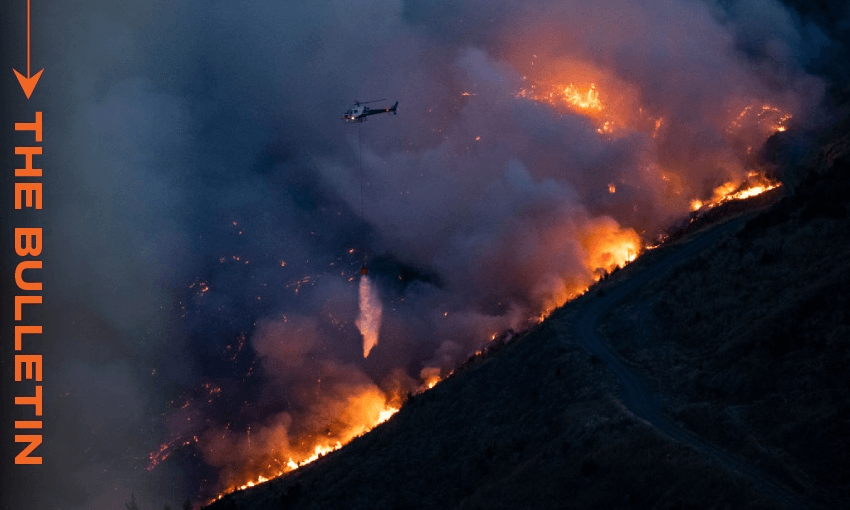23 firefighter crews and 13 helicopters have returned to battle the blaze with hot windy weather expected in Christchurch today, writes Anna Rawhiti-Connell in this excerpt from The Bulletin, The Spinoff’s morning news round-up. To receive The Bulletin in full each weekday, sign up here.
Fresh firefighting crews working to contain blaze this morning
A State of Local Emergency was declared for Christchurch City (including Banks Peninsula) and Selwyn District last night after a large vegetation fire broke out in Christchurch’s Port Hills yesterday afternoon. As of sending, it remains in place. RNZ has a summary of key information and a live blog. Crews of firefighters continued to work overnight battling the blaze, with fresh crews arriving at 6am this morning. 13 helicopters and two fixed-wing aircraft have also been deployed, and the New Zealand Defence Force has also been engaged. Residents have been evacuated from Early Valley, Worsley Spur, Hoon Hay Valley and Kennedys Bush. A public health warning for smoke from the fire was issued yesterday by Te Whatu Ora.
No major flare ups overnight, hot windy conditions forecast
FENZ provided an update around 7am this morning. There were no major flare-ups overnight, and protecting structures and working on containment lines will be the main priorities for crews today. Speaking to Newstalk ZB this morning, Christchurch mayor Phil Mauger confirmed 80 homes have been evacuated. A live briefing from FENZ police and local mayors got underway at 7.30am. There will be a briefing for evacuated residents at the Halswell Community Centre at 11am, and a community hub will also be opened at the bottom of Worsley Rd from 8am. Early reports this morning from media indicate the fire remains uncontained, and the Herald is reporting it has spread to the Christchurch Adventure Park. MetService meteorologist David Miller says a gusty north-westerly wind will be returning to the region later this morning, along with forecasted temperatures of up to 28 degrees.
2017 Port Hills fires still fresh in people’s memories
For many, it is bringing back memories of the Port Hills fires seven years ago, which started on 13 February 2017. A couple who live on Worsley Road, which has been evacuated, had only moved into their house five weeks ago after rebuilding it following the 2017 fires. That fire claimed the life of one firefighter and destroyed nine homes. It took 66 days to extinguish the fires fully. A review into the response from emergency services was conducted and found poor cooperation between fire agencies led to confusion. Residents in the area yesterday said the fire service’s response to the blaze seems far more coordinated than its response in 2017. At the time, FENZ rural regional manager Richard McNamara said with the climate changing and the weather becoming more extreme, fires that have the complexity of the Port Hills fire will be seen more often.
‘More and more extreme fire days each year’
The cause of the fire is yet to be established, and FENZ are asking the public for help, requesting that any photos or videos from around the area taken between 1.45 and 2.45pm yesterday be sent to them. In comments supplied by the Science Media Centre, Nicola Day from the School of Biological Sciences at Victoria University said FENZ has been warning us all summer about tinder dry conditions that will fuel fires. Shana Gross, a wildfire scientist at Scion, said, “We know that fire conditions are worsening, and there are more and more extreme fire days each year. The changing climate is increasing the frequency and severity of wildfires, and escalating the risks, not just in rural areas like we saw last week in Lee Valley, but also where people feel more secure like the edges of cities.” Writing for the New York Times yesterday, David Wallace-Wells references fire historian Stephen Pyne, who says “we are now living in the ‘pyrocene’”. Globally, “forest fires are now burning twice as much tree cover as they did just 20 years ago.”


